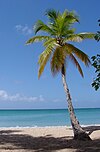Neonicholsonia

| Neonicholsonia | |
|---|---|
 | |
| Scientific classification | |
| Kingdom: | Plantae |
| Clade: | Tracheophytes |
| Clade: | Angiosperms |
| Clade: | Monocots |
| Clade: | Commelinids |
| Order: | Arecales |
| Family: | Arecaceae |
| Subfamily: | Arecoideae |
| Tribe: | Euterpeae |
| Genus: | Neonicholsonia Dammer |
| Species: | N. watsonii |
| Binomial name | |
| Neonicholsonia watsonii | |
| Synonyms[2] | |
| |
Neonicholsonia is a monotypic genus of flowering plant in the palm family native to Central America (Honduras, Nicaragua, Costa Rica, Panama).[2][3][4][5][6] The sole species is Neonicholsonia watsonii. The genus and species names honor George Nicholson, a former curator of the Royal Botanic Gardens, Kew and his successor William Watson.[7]
Description
[edit]The trunk is solitary and acaulescent or barely emergent, producing 1.5 m leaves, pinnately cleft, with a gentle arch. The leaves are carried on short petioles, the leaflets grow to 30 cm, elliptical, and colored emerald green, and are widely and regularly arranged along the rachis. The inflorescence is a solitary, interfoliar spike with a long, slender peduncle, carrying male and female flowers. The fruit is ellipsoidal, black when ripe, with one globose seed.[7]
Distribution and habitat
[edit]Found in the rainforests from Nicaragua to Panama from sea level to 250 m.[8]
References
[edit]- ^ Dammer, Gardeners' Chronicle series 3, 30:178. 1901.
- ^ a b Kew World Checklist of Selected Plant Families
- ^ Stevens, W.D., Ulloa U., C., Pool, A. & Montiel, O.M. (2001). Flora de Nicaragua. Monographs in Systematic Botany from the Missouri Botanical Garden 85: i-xlii, 1-2666.
- ^ Hammel, B.E. & al. (2003). Manual de Plantas de Costa Rica 2: 1-694. Missouri Botanical Garden Press, St. Louis.
- ^ Govaerts, R. & Dransfield, J. (2005). World Checklist of Palms: 1-223. The Board of Trustees of the Royal Botanic Gardens, Kew.
- ^ Nelson Sutherland, C.H. (2008). Catálogo de las plantes vasculares de Honduras. Espermatofitas: 1-1576. SERNA/Guaymuras, Tegucigalpa, Honduras.
- ^ a b Riffle, Robert L. and Craft, Paul (2003) An Encyclopedia of Cultivated Palms. Portland: Timber Press. ISBN 0-88192-558-6 / ISBN 978-0-88192-558-6
- ^ Uhl, Natalie W. and Dransfield, John (1987) Genera Palmarum - A classification of palms based on the work of Harold E. Moore. Lawrence, Kansas: Allen Press. ISBN 0-935868-30-5 / ISBN 978-0-935868-30-2
